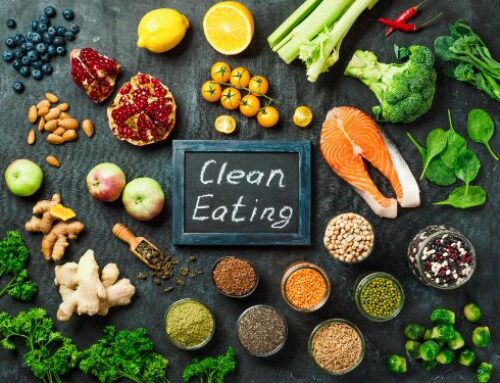With all the talk of healthy eating and a balanced diet, it’s important to break down what actually makes a diet healthy. From how much fiber to eat to the appropriate amount of calories to consume in order to reach your goal (be it to maintain your weight, build muscle or lose weight), there are plenty of factors that play into creating a healthy diet.
How many calories should you consume per day?
To start building your balanced diet, it’s a good idea to start evaluating your activity level to determine the amount of calories you need to support that activity level. Calorie.net offers a calorie calculator that lets you input your age, gender, weight, height and activity level before giving you the target calorie intake you should be shooting for. Once you know your recommended caloric intake, it’ll be much easier to portion out your nutrient intake.
Portion control
The United States Department of Agriculture’s MyPlate program breaks down the components of a healthy meal by assigning food groups to a proportion on a plate. To begin, an individual should consume more vegetables and fruits than proteins and grains. In fact, vegetables and fruits should take up half the plate and then proteins and grains take up the remaining half of the plate and should be portioned at one fourth each. That’s the visual representation.
Since sizes of plates can change, Kerry Torrens from BBC Good Food offers our hands as a walking measure. The amount of carbs such as rice, pastas, and breads consumed per meal should be no more than clenched fist. The amount of protein should fit in the palm of our hands. WebMD suggests 10 healthy protein options, including seafood, eggs, beans, and lean beef. There are even measurements for butters (yes, they are part of a healthy diet, but only when in moderation), nuts and sweets. This system also takes into account the difference in nutritional requirements for men and women.
Regulate intake
While Berkeley Wellness doesn’t necessarily offer measurements on intake of certain nutrients, their list of 14 tips to a healthy diet include important reminders and possible substitutions. Not only does a healthy diet call for a reduction in sugar consumption, it also calls for a reduction in alcohol consumption. This isn’t to say cut both food groups out completely, but it is a reminder to consume both in moderation.
Another reminder from Berkeley Wellness is that not all fats are bad. For example, butter is high in unhealthy fats, but substitute it with olive oil and you’ll be adding omega-3 fatty acids and oleic acid which may reduce inflammation. Fish are also high in fats, but these fats also include omega-3, which can improve eye health and age-related diseases, according to Freydis Hjalmarsdottir from Healthline.
Helpful meal plans
Sometimes, it’s easier to build diets off of examples, so Shereen Lehman from Verywell Fit created a seven-day meal plan complete with three daily meals and snack ideas. Vanessa Martin also has a seven-day meal plan on Nautilus Plus demonstrating a healthy, balanced meal plan. These two guides provide two weeks of meal ideas and hopefully plenty of inspiration to build even more healthy meal plans.





Great summary of what is a balanced diet, it is so important to actually keep this as a lifestyle. If one is not consistent, full advantage may not be possible, humanity should realize that lifelong efforts must be maintained in order to become successful in this endeavor and to pass it on to our families, friends and all whom we care about.
I agree with Much of what you have said here. Still, PEOPLE MUST GO 1st to a doctor to start this New Diet of food, so the diet can take into consideration any medical needs of the body. Thank you for listening.
That is a good point Robert. Thanks for sharing 🙂
Will power is the most important thing to stay on a Diet.
I don’t really have a daily diet I guess I just burn what I eat off fast so I don’t really gain much weight but I do watch what snacks I do eat daily.
I agree with Mr. Brown to go to your doctor first before changing your diet. I have had to completely eliminate grains for example. Overall though, this article is a good outline to start at.
I also believe the health concerns of an individual must be considered in planning a healthy diet. However, all of the tips and guidelines mentioned are excellent tools for use by people who are presumably healthy.
I think that was too much information but not info on what a healthy diet actually is. The things said were the obvious and not very clear in my opinion. What is a healthy diet is different for everyone .
Lots of great information here. I agree that portion control and less sugar intake are definitely two areas of concern while considering a healthy diet.
I am familiar with much of the information provided by you and others and have benefited from it. Not only have I lost significant weight but have also continued to lose and/or maintain my loss via frequent exercise and food choices.